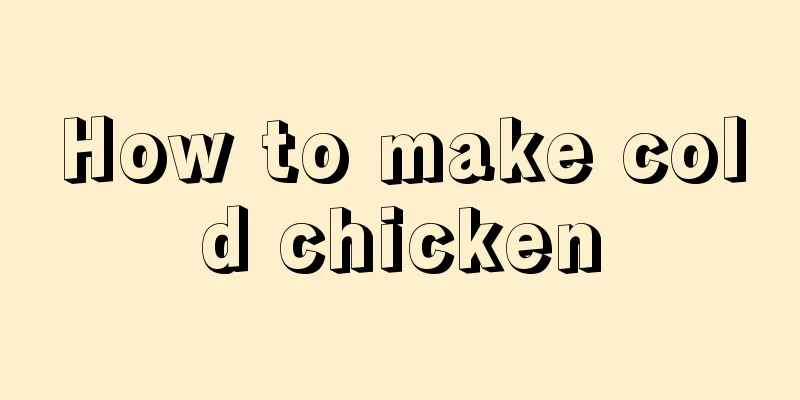Is baby rice cereal cooked?

|
After 6 months, the baby's normal energy needs can no longer be met by drinking milk powder or breast milk, and complementary foods need to be added. When talking about baby food, the first thing that comes to mind is rice noodles. Baby rice noodles are half-cooked and will be cooked through as long as they are diluted with warm water. Many grandparents think that purchased rice noodles are not as nutritious as homemade rice noodles. This is a very wrong idea. Purchased rice noodles contain many trace elements that homemade rice noodles do not have. Now, Xiaobao will take stock of the wrong practices that parents make when it comes to rice noodles. 1. Give your baby homemade rice cereal Because the iron content in breast milk is very low, the iron stored in the body of babies who are exclusively breastfed is almost used up after they reach 6 months old, and they need additional iron supplements. 7-12 months is the peak period for iron deficiency anemia in children. The American Academy of Pediatrics also recommends that babies take small doses of iron supplements after 4 months to prevent iron deficiency anemia. Therefore, commercially available baby rice cereal with added iron is the best choice. At the same time, some brands of rice noodles are specially processed to make the nutrients easier to absorb, which is impossible for homemade rice noodles. 2. Rinse rice noodles with boiling water Many brands of rice noodles will have the brewing temperature written on their packaging. Some parents use boiling water to make rice noodles without even reading the instructions, only to find that it is difficult to make the noodles dissolve. This may also change the properties of the rice noodles and affect nutrient absorption. 3. Too thick or too thin Many parents want to give their children more nutrition, so they make the rice flour very thick, so that it sticks to the bottom of the bowl like plasticine. Another reason is that people are worried that their children won’t be able to digest the rice noodles, so they make the rice noodles too dilute, like soup. Both of these are not good. Here we suggest that parents refer to the ratio on the package for mixing. The ideal state of the prepared rice noodles should be that the rice noodles can flow slowly when the container is tilted. 4. Add sugar, salt, soy sauce to the rice noodles... Some parents think that rice noodles are too light and worry that their babies will not want to eat them, so they add various seasonings, but they don’t know that the baby’s taste should be light at this time. Adding seasonings is not only unhealthy for babies, but also makes them develop a habit of heavy tastes, which may make them more susceptible to high blood pressure, diabetes and other diseases when they grow up... (See "Why should complementary foods for children under 1 year old be salt-free and low in sugar? How much oil should be added? How much onion, ginger, sauce, vinegar and garlic?") However, as the baby gradually gets used to rice noodles, parents can add some pureed vegetables, pureed meat, etc. to make the rice noodles less monotonous. 5. Eat rice noodles every meal Don’t treat rice noodles as your baby’s staple food, or even let it take the place of milk. At the beginning, parents can only add one or two mouthfuls of rice cereal, and gradually progress to replacing one meal with rice cereal. After the baby adapts, other complementary foods can be gradually added. But before the age of 1, the baby's main food is still milk. 6. Feed your baby rice cereal with a bottle Some mothers think that babies will be more receptive to rice porridge if they are fed with a bottle. Not to mention the issue of whether the pacifier will be blocked (in fact, these parents will cut a hole in the pacifier), using a bottle to hold rice cereal is not conducive to the full mixing of the rice cereal and salivary amylase, affecting digestion; secondly, it is not conducive to the development of the baby's oral motor ability. Because what the baby needs to exercise at this time is not the sucking ability, but the ability to eat normally. You can't let him eat with a bottle for convenience until he goes to school, right? At the same time, it is also recommended that parents buy a dining chair for their baby to cultivate the baby's dining habits and let the baby know that sitting here means eating. 7. Feed your child rice cereal for n months without adding other complementary foods In fact, rice noodles are just a transition. After the baby adapts to it, other foods must be added in time. In addition to soft and mushy foods such as vegetable paste and noodles, you should also give the baby some finger foods that he can eat with his hands to train the baby's ability to chew and eat independently. After the baby starts to grow teeth, you should give him some teething food to chew. This is good for training his oral muscles and developing his language skills. |
>>: Baby milk powder preparation temperature
Recommend
Stir-fried pork head
Modern people are under great pressure in life an...
How to make Tangzhong raisin buns
As competition becomes increasingly fierce, more ...
How to make Norwegian salmon appetizer crispy topping
In today's world where cancer is rampant, hav...
Honey roast chicken legs
As a woman, should you learn to cook some decent ...
How to cook dry-fried rabbit meat
Dry-fried rabbit meat is a food that many people ...
How to make meat floss ham bread rolls
Eating out often is neither healthy nor economica...
How to make black and white fried chicken
During the holidays, I believe everyone will go b...
How to make fresh milk pudding bread
We have many foodie friends in our lives. If we h...
How to make braised dried tofu with phoenix eye fruit
Eating out may seem to save you trouble on the su...
How to make cumin and soy sauce bean rolls
Health preservation is a state of mind that requi...
How to make small red pumpkin porridge
Going out to eat every day, to be honest, the foo...
How to make sweet sesame taro
With today's booming economy, more and more p...
How to make classic dish - braised pork
People cannot live without food, clothing, housin...
How to make chicken rice bean dregs soup
Many delicious foods can be made by more than jus...
How to make bird's nest stewed eggs
Under the torture of scorching heat, you have no ...









